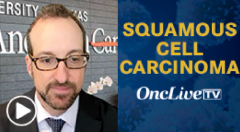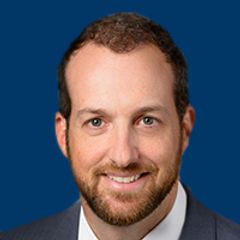
Dr Gross on the Neoadjuvant Utility of Cemiplimab in CSCC
Neil D. Gross, MD, FACS, discusses the neoadjuvant use of cemiplimab in the treatment of patients with cutaneous squamous cell carcinoma.
Episodes in this series
Neil D. Gross, MD, FACS, surgeon-scientist, director, Clinical Research, professor, Department of Head and Neck Surgery, Division of Surgery, The University of Texas MD Anderson Cancer Center, discusses the neoadjuvant use of cemiplimab-rwlc (Libtayo) in the treatment of patients with cutaneous squamous cell carcinoma (CSCC), highlighting patients in whom he would use this approach.
Gross moderated a workshop with OncLive® on treatment strategies for non-melanoma skin cancer, in which strategies for managing advanced CSCC were discussed. Gross says the event delved into the safety profiles of neoadjuvant approaches involving cemiplimab. The existing data indicate that the safety of this agent is well acknowledged. These findings were corroborated by the clinical experiences shared by the experts at the event, although attendees noted that the data are still emerging, Gross reports. Unlike melanoma, in which many randomized phase 3 datasets are available, there is a current lack of robust data for CSCC, he emphasizes.
Looking to the utility of cemiplimab, experts discussed the phase 1/2 CONTRAC-1 trial (NCT04339062) investigating cemiplimab in patients with CSCC who were eligible for kidney transplants, Gross continues. Gross highlights that this disease population tends to be elderly, often with multiple medical comorbidities. These patients face logistical challenges, such as frequent clinic visits for treatment, making them particularly suited to benefit from neoadjuvant approaches, he says.
For patients with locoregionally advanced disease requiring surgery and radiation, the burden of such treatments can be substantial, he expands. Thus, neoadjuvant strategies are considered beneficial for older patients with resectable disease, Gross reports. However, for patients with borderline resectable tumors, there is a risk of disease progression to an unresectable state, making these patients less suitable candidates for neoadjuvant treatment, he says. In the future, oncologists will focus on enrolling older patients with locally advanced disease needing multimodal treatment in forthcoming randomized phase 3 trials to further refine and validate these approaches, Gross concludes.






































